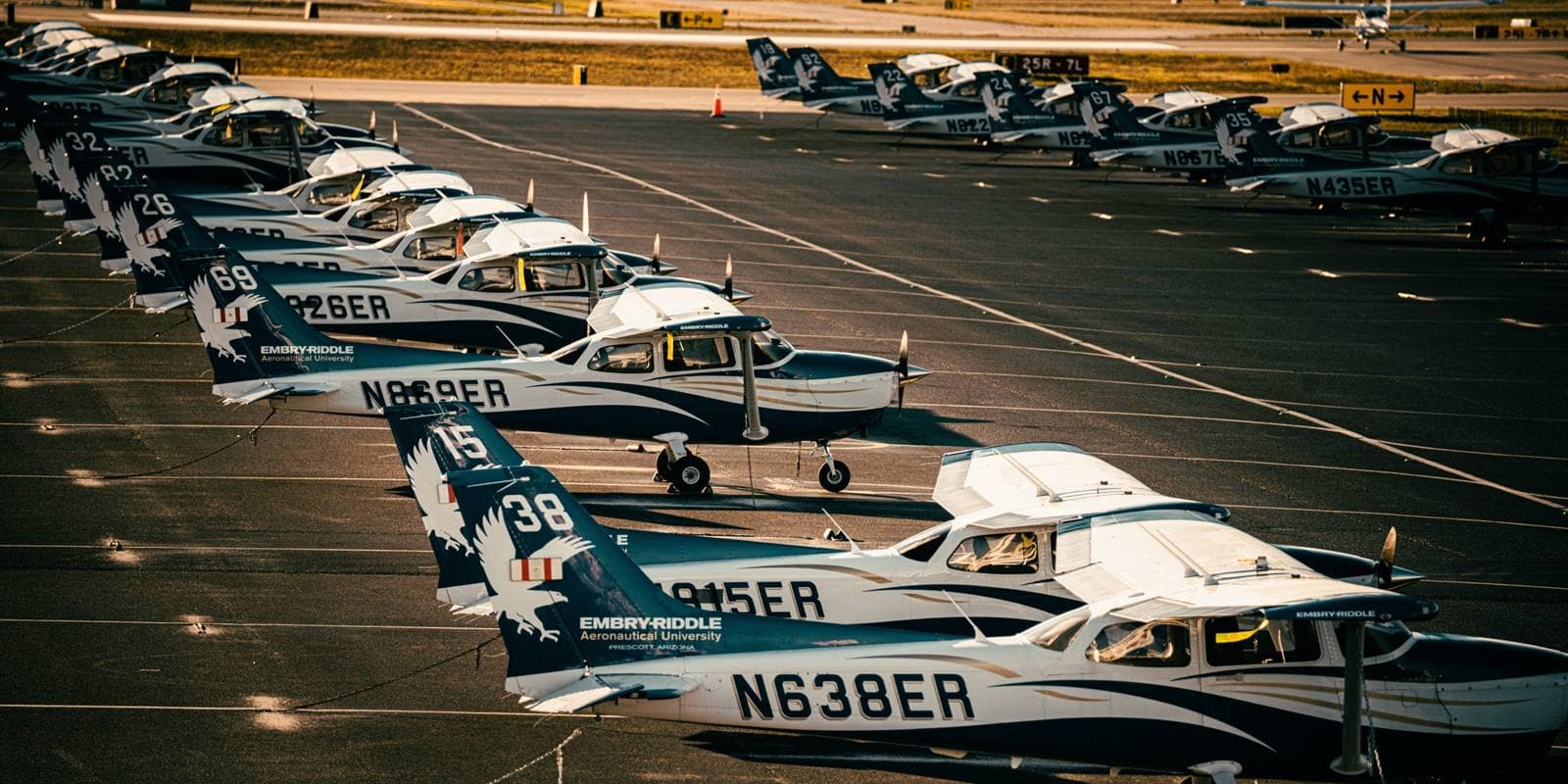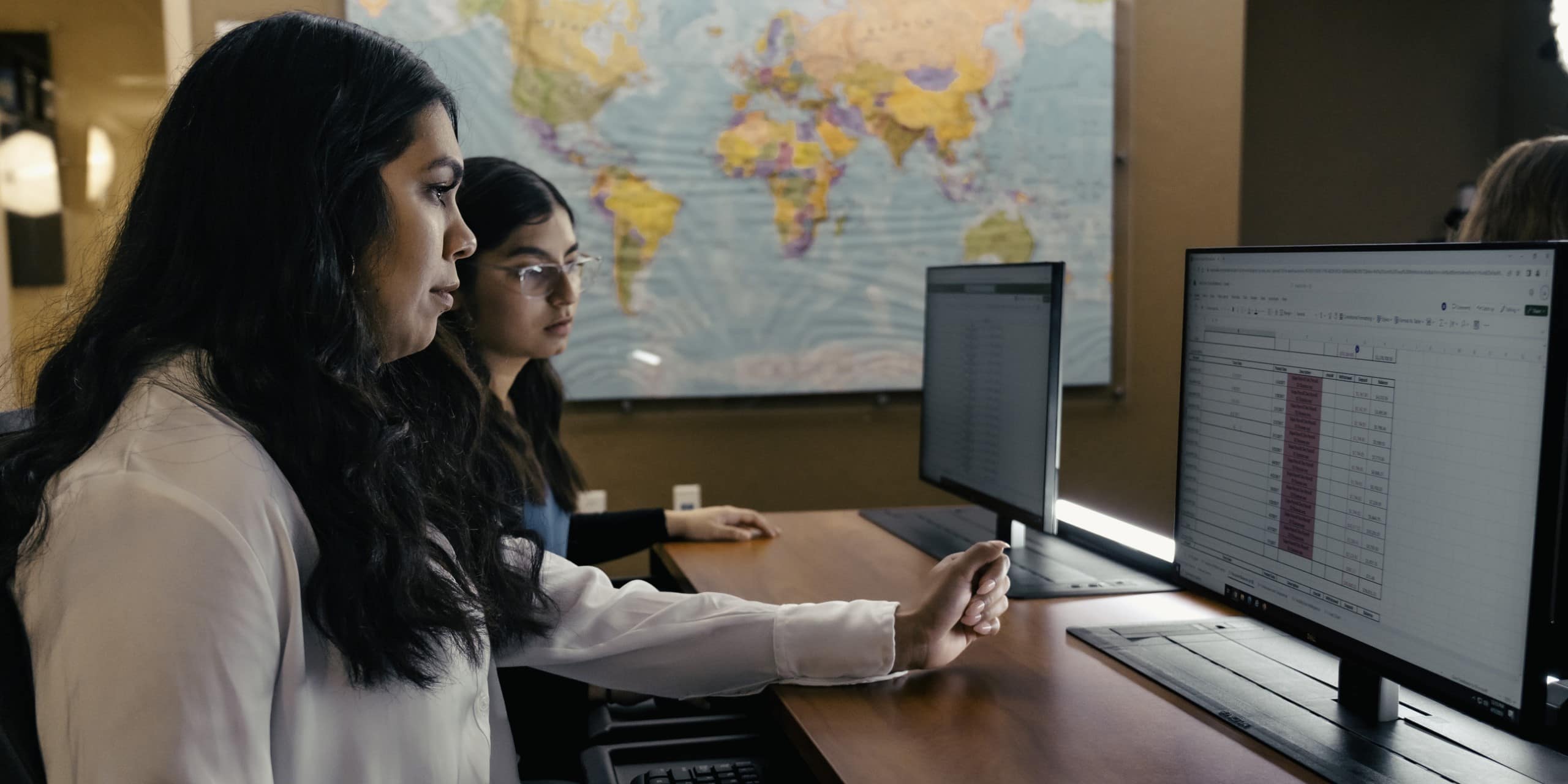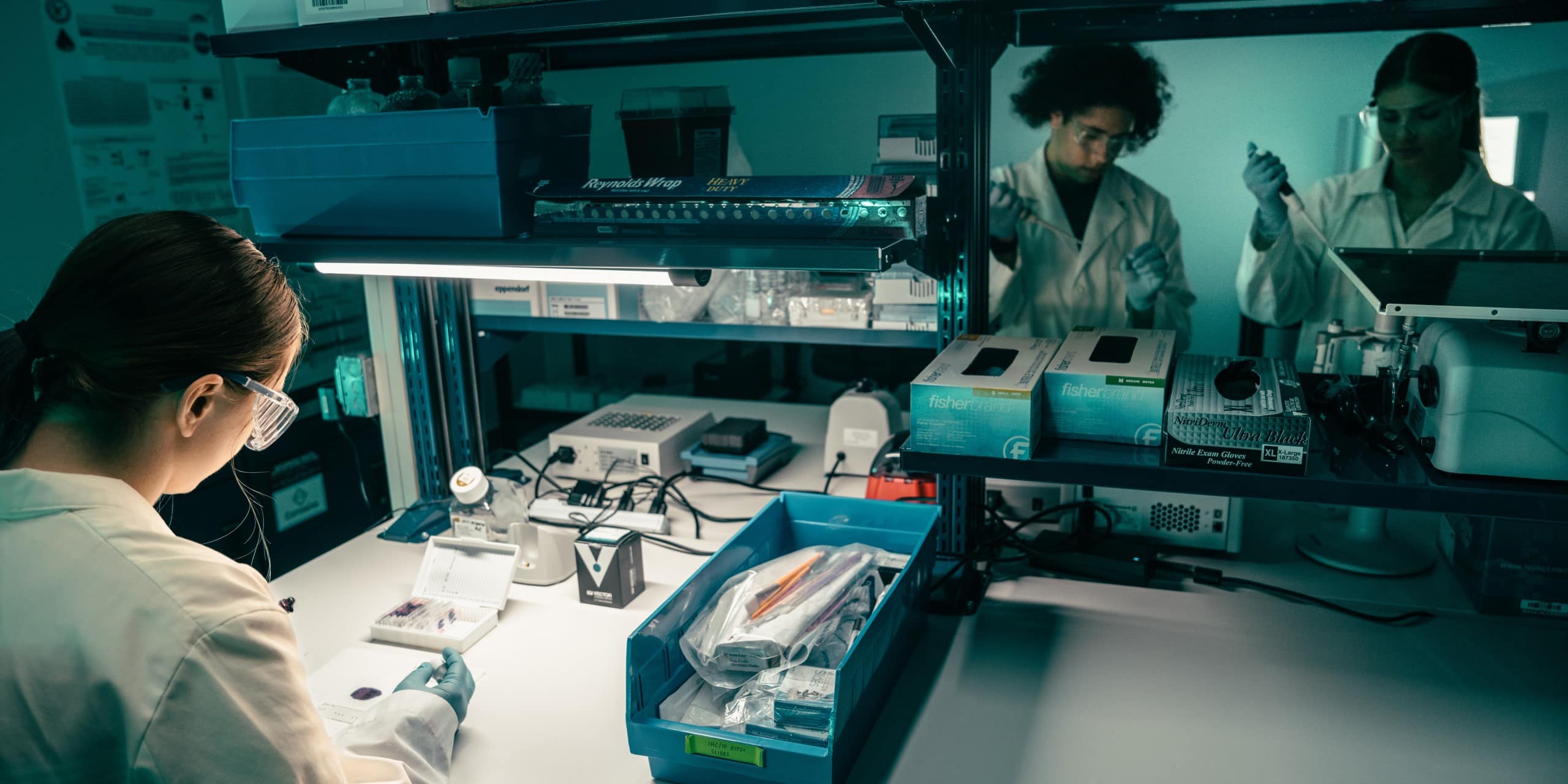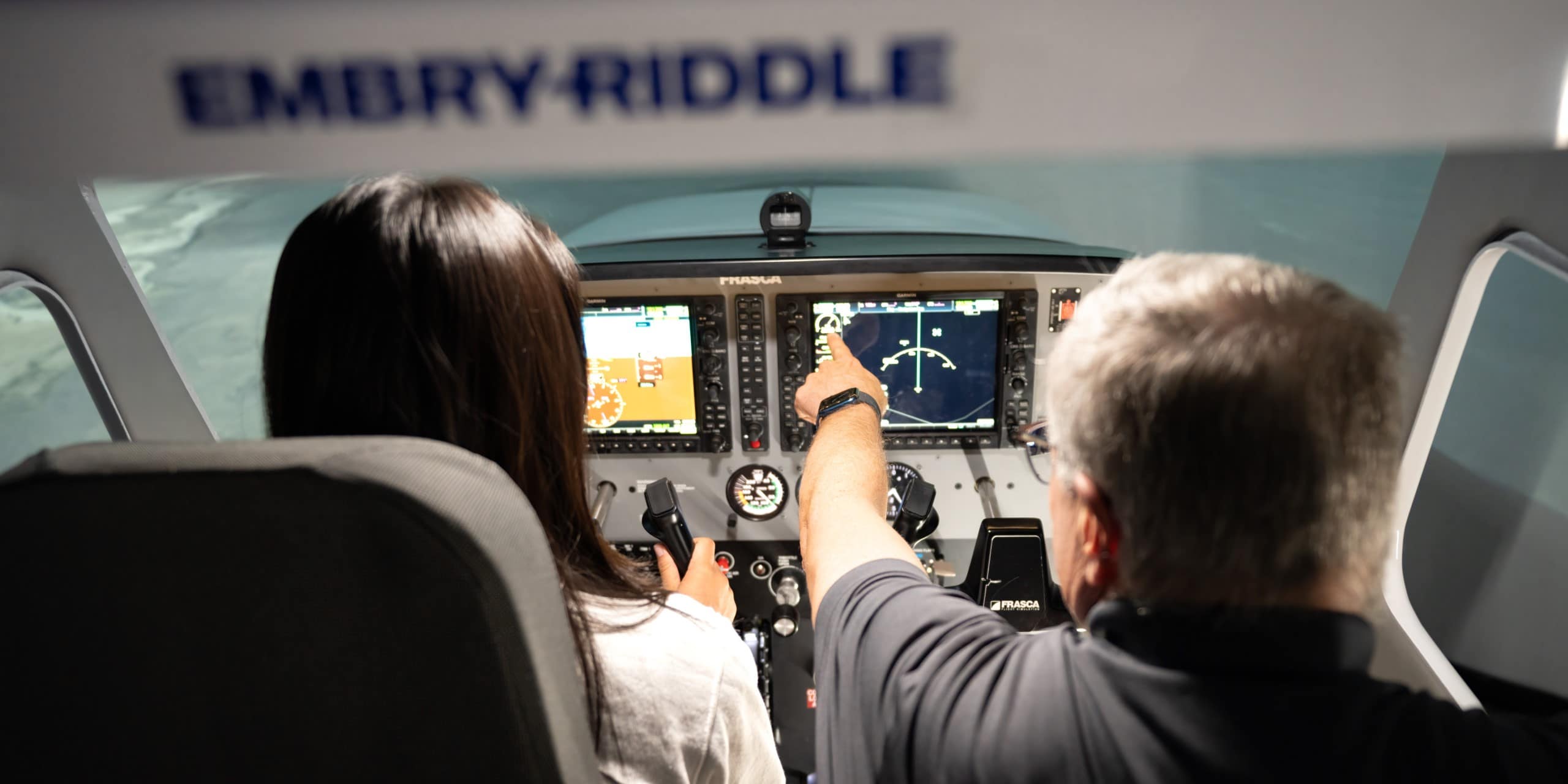
Master of Science in
Aeronautics
The Master of Science in Aeronautics degree program allows students in the aerospace industry to advance their careers through specialization.
About the Master of Science in Aeronautics
Embry-Riddle Aeronautical University offers a master’s degree in Aeronautics to help aerospace and aviation professionals pursue additional career opportunities. Whether you are currently in the aerospace industry as a pilot, air traffic controller, meteorologist, aviation educator, or safety officer — a graduate degree in Aeronautics could help take your career to new heights.
The Master of Science in Aeronautics (MSA) degree program requires a rigorous curriculum to ensure the highest standards of performance, quality and integrity are maintained.
Student Learning Outcomes
While earning an aviation master's degree online, you will have the opportunity to:
- Combine solid core classes with unique specializations targeting the aviation and aerospace industry
- Learn the tools needed to develop, manufacture and operate aircraft and spacecraft
- Gain a comprehensive understanding of the infrastructure that supports the industry
Aeronautics Career Opportunities
Careers and Employers
Embry-Riddle graduates are set to enter the aerospace industry; finding careers as pilots, captains, maintenance managers, air battle managers, UAS operators and evaluator pilots.
Students earning an aviation degree often accept employment offers from top companies such as Boeing, Northrop Grumman, Federal Aviation Administration, Air Transport International and the U.S. Military.
Aeronautics Salary Information
With demand in the aerospace industry rising, earning an aviation degree from Embry-Riddle provides the opportunity for competitive salaries averaging $130,000 annually as of 2023.
DETAILS
About Aeronautics at the Worldwide & Online Campus
Embry-Riddle Worldwide gives you the freedom to take your Aeronautics graduate courses online at your convenience. Although our online Aeronautics program may not always physically be in a classroom, students still gain personal, hands-on experience using tools like our Virtual Hub to design and test fly an Uncrewed Aircraft System (UAS) or conduct an aviation accident investigation with the Virtual Crash and Virtual Aerial Robotics Lab.
As a member of the Embry-Riddle network, you’ll gain access to experienced faculty, industry professionals, fellow students, and professional organizations.
Tracks/Specialties and/or Certificates
Students earning their master's degree in Aeronautics can focus on specializations such as:
- Aviation and Aerospace Sustainability
- Small Uncrewed Aircraft Systems (sUAS) Operations
- Uncrewed and Autonomous Systems
- Space Operations
- Aviation Safety
- Human Factors
- Aviation Maintenance
- Aviation Cybersecurity
- Research
Aeronautics Information
- Credits: 30
- Online or In-Person: Fully online, EagleVision Virtual Classroom, or see if a Worldwide location is close to you
Helpful Links
- Attend a Worldwide Virtual Info Session
- Discover the Department's Faculty
- Explore the Fields of Study: Aviation & Space
- Find Related Clubs & Organizations
Royal Aeronautical Society
The Master of Science in Aeronautics program is recognized by the Royal Aeronautical Society (RAeS).
Student Learning Outcomes
Students will:
- Apply mathematics, science, and applied sciences at a level appropriate to aviation-related disciplines at the master’s level, including an adequate foundation in statistics.
- Analyze and interpret data at the master’s level.
- Work effectively on multi-disciplinary and diverse teams.
- Make professional and ethical decisions.
- Communicate effectively, using both written and oral communication skills.
- Engage in and recognize the need for life-long learning.
- Assess contemporary issues.
- Use the techniques, skills, and modern technology necessary for professional practice.
- Assess the national and international aviation environment.
- Apply pertinent knowledge in identifying and solving problems.
- Apply knowledge of business sustainability to aviation issues.
- Apply advanced qualitative and quantitative problem-solving skills.
DEGREE REQUIREMENTS
Core/Major
| MSA Core Requirements | ||
| ASCI 602 | The Air Transportation System | 3 |
| ASCI 604 | Human Factors in the Aviation/Aerospace Industry | 3 |
| ASCI 674 | Project Management in Aviation/Aerospace | 3 |
| ASCI 516 | Applications in Crew Resource Management | 3 |
| ASCI 645 | Airport Operations and Management | 3 |
| ASCI 693 | Current Research Problems in Aviation/Aerospace | 3 |
| RSCH 665 | Statistical Analysis | 3 |
| Total Credits | 21 | |
Specialization
| Specialization | 9 | |
| Choose at least one of the Specializations listed. | ||
| Total Degree Requirements | 30 | |
Specializations:
Aviation and Aerospace Sustainability
| AASI 600 | Sustainable Aviation and Aerospace Perspectives | 3 |
| AASI 625 | Sustainability Policy in Aviation and Aerospace | 3 |
| AASI 629 | Sustainable Air Vehicles; Design and Propulsion | 3 |
Small Uncrewed Aircraft Systems (sUAS) Operations
| Students declaring the sUAS Operations Specialization or registering for courses within it must be physically located within the U.S. when registering for and while participating in the UNSY 520 and UNSY 620 courses. Students must contact their Academic Advisor regarding additional cost, possible travel, and FAA Testing, prior to enrolling in the first course of this specialization, UNSY 515. | ||
| UNSY 515 | sUAS Operation Fundamentals | 3 |
| UNSY 520 | sUAS Practical Application and Assessment | 3 |
| UNSY 620 | sUAS Operational Planning and Safety Management | 3 |
Uncrewed and Autonomous Systems
| UNSY 501 | Application of Uncrewed and Autonomous Systems | 3 |
| UNSY 603 | Uncrewed and Autonomous Systems Operational Configuration | 3 |
| UNSY 503 | Legal and Regulatory Issues in Uncrewed and Autonomous Systems | 3 |
Space Operations
| SPAC 511 | Geospatial Analytics | 3 |
| SPAC 512 | Human Spaceflight Industry | 3 |
| SPAC 514 | Commercial and Governmental Space Infrastructure | 3 |
Aviation Safety
| MSAS 611 | Aviation/Aerospace System Safety | 3 |
| MSAS 615 | Aviation/Aerospace Accident Investigation and Analysis | 3 |
| MSAS 621 | Aviation/Aerospace Safety Program Management | 3 |
Human Factors
| MSHF 606 | Human Cognition | 3 |
| MSHF 612 | Human Performance, Limitation, and Error | 3 |
| MSHF 624 | Ergonomics and Biomechanics | 3 |
Aviation Maintenance
| MAVM 601 | Leadership in Global Aviation Maintenance Organizations | 3 |
| MAVM 605 | Global Maintenance Resource Management | 3 |
| MAVM 615 | Strategic Management of Global Maintenance, Repair and Overhaul (MRO) Operations | 3 |
Aviation Cybersecurity
| MACY 515 | Foundations of Aviation Cybersecurity | 3 |
| MACY 520 | Aviation Cybersecurity Threats, Actors, Tools, and Techniques | 3 |
| MACY 525 | Aviation Cybersecurity Risk Management and Resilience | 3 |
Research
| RSCH 670 | Research Methods | 3 |
| RSCH 700A | Thesis I | 3 |
| RSCH 700B | Thesis II | 3 |
Get Started Now:
Summary
30 Credits
Estimate your tuition by using the Tuition Calculator
View Financial Aid Information
Learn more about the benefits of an Online Degree
Learn about our General Education
Find out about transferring credits to this degree
Learn more about our Veterans & Military benefits
View our Academic Calendar
Search Courses for this degree




